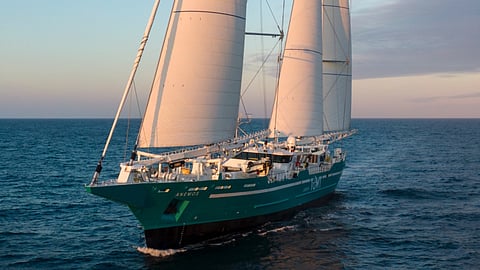VESSEL REVIEW | Anemos & Artemis – French transport company introduces sailing cargo ships on transatlantic routes
French transport company TOWT recently took delivery of two new sailing cargo ships in a series from French shipbuilder Piriou. Anemos and Artemis will be used to transport various cargo including tea, coffee, and wine via the Atlantic Ocean.
Whereas Anemos was built at Piriou's facilities in Romania, Artemis was constructed at the company's Vietnam shipyard. Construction of each of the vessels lasted approximately 24 months.
The introduction of this new fleet of sailing cargo ships is in line with TOWT’s aim of creating lower-emission alternatives to conventional container vessels powered by internal combustion engines. The ships and their equipment will also comply with regulations that cover cargo vessels sailing on international routes and with gross tonnages greater than 500 UMS. The advanced sail technology was inspired by that used by vessels built for ocean racing.
Sails coupled with a hybrid power setup for greater operational flexibility
The TOWT vessels each have a length of 81 metres (270 feet), a beam of 15 metres (49 feet), a height of 63 metres (210 feet), and a cargo hold for transporting palletised goods totalling 1,100 tonnes. The sails will provide all of the propulsive power needed by each vessel with a sail rigging of 2,200 square metres (24,000 square feet) spread over two masts, while navigation will be aided by an autonomous routing system that utilises artificial intelligence and meteorological data. Using the sails alone, the vessels can already achieve a top speed of 10 knots.
Dimension-Polyant supplied the customised cloth that was used for the sails. The sails were designed and built by Incidence Sails and are of a customised material optimally suited to the application’s requirements.
The ships are designed to operate for up to 320 days at sea per year. Navigation will principally be sail-powered, but the ships will also have a hybrid power mode with one or two turbocharged four-stroke diesel engines operating at different levels of power. A bow thruster is also fitted to provide additional lateral manoeuvrability in port waters.
On the bridge, there is a single command station and its ergonomics will allow the officer of the watch to carry out all the commands and course adjustment operations, excluding manoeuvres, alone.
First two in a new oceangoing fleet
The vessels also boast wake energy recovery technology using batteries and controllable-pitch propellers acting as hydro-generators. Piriou said the vessels’ operations will enable greenhouse gas emissions of at least 93 per cent for CO2, 98 per cent for SOx, and 97 per cent of NOx depending on wind conditions.
Anemos has already completed three trips from Le Havre to New York. In 2025, it is scheduled to sail the route eight times with stops in ports such as Point-a-Pitre in the French overseas territory of Guadeloupe and Houston.
Piriou will build another six sailing cargo ships from the same series under a newbuilding contract awarded by TOWT in 2022. These vessels are scheduled for delivery in 2026 and 2027.


